Widespread Backlash Against APEC in S.F.,
but Why?
Eve Lu/Peninsula Press
December 2023
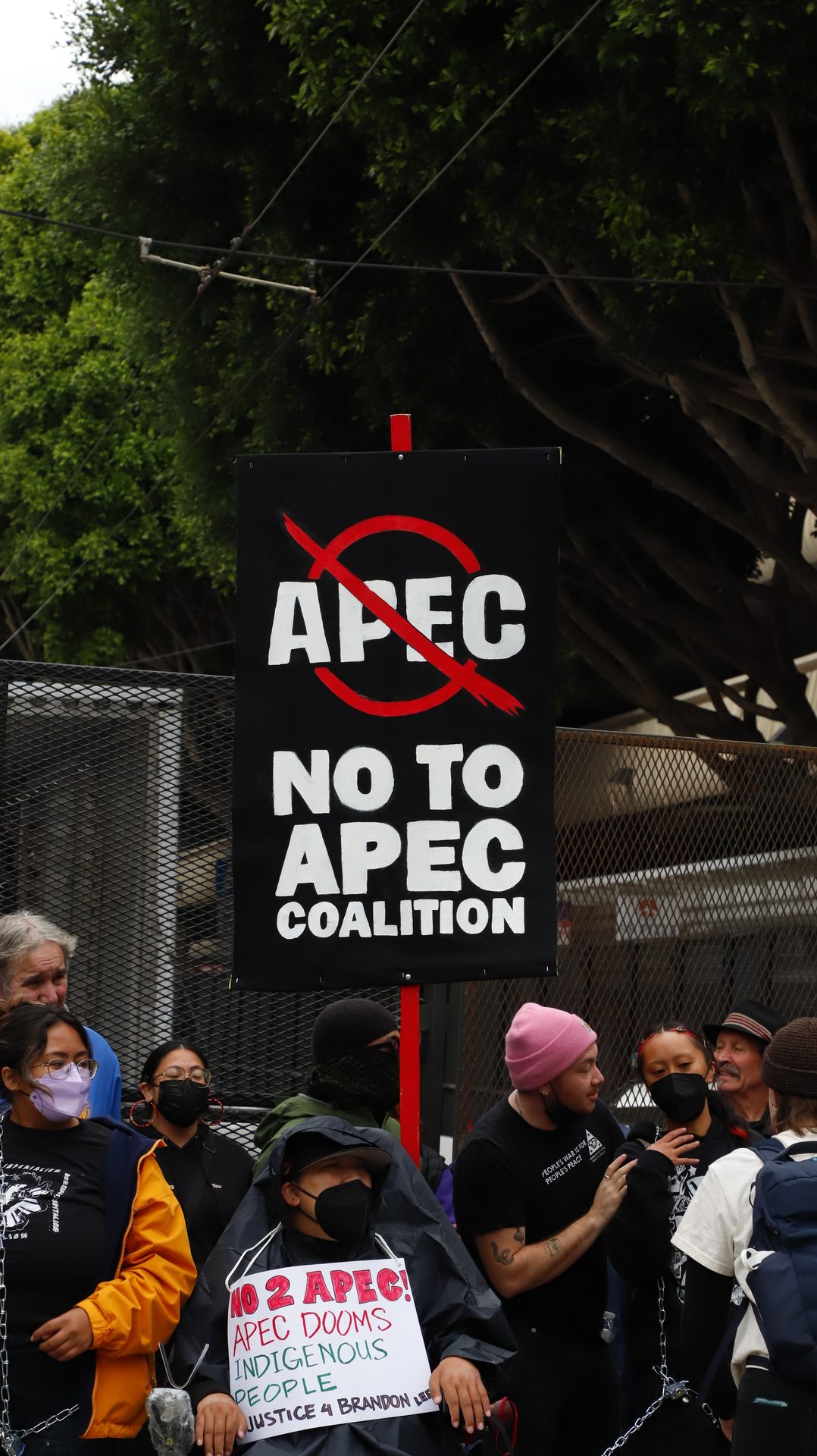
SAN FRANCISCO, CA – Last month, under the theme of “Creating a Resilient and Sustainable Future for All,” thousands of global corporation heads and 21 world leaders gathered in San Francisco for the APEC conference, beginning on Nov 11 and continuing through the following week until Nov 17.
This has marked the third time the U.S. has hosted an APEC summit, having previously hosted in 1993 on Blake Island and 2011 in Honolulu.
APEC, which stands for the Asia-Pacific Economic Cooperation, is a regional intergovernmental forum consisting of 21 member economies that convenes annually to engage in free trade policy collaboration within the Asia-Pacific region. The major players include the United States, China, Japan, South Korea, and others.
Photo: No to APEC" protesters gather to create a human barrier, preventing APEC leaders from entering the summit at 88 Fifth Street in San Francisco on Nov. 15, 2023. (Eve Lu/Peninsula Press)
However, human rights advocates, labor unions, climate justice defenders and other concerned organizations globally argue that behind closed doors, international trade agreements prioritize corporate interests over the well-being of local communities, exploiting workers, intensifying resources, weakening the self-determination of local communities.
For this reason, an extensive alliance of groups, the “NO 2 APEC Coalition” organized a series of protest actions throughout the APEC conference week.
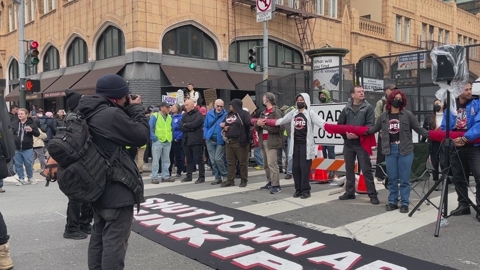
Video: "No to APEC" activists belt out their protest tunes at 88 Fifth Street in San Francisco on Nov. 15, 2023. (Eve Lu/Peninsula Press)
On Nov. 15, downtown San Francisco saw hundreds of protesters spreading out, attempting to block APEC attendees from entering the key summit meeting. The protestors formed human barriers at different crossroads that were the main pathways to the Moscone Center under a heavy police presence.
Law enforcement maintains a robust presence as “No to APEC” protesters gather in San Francisco on Nov. 15, 2023, ensuring security amid heightened tensions. (Eve Lu/Peninsula Press)
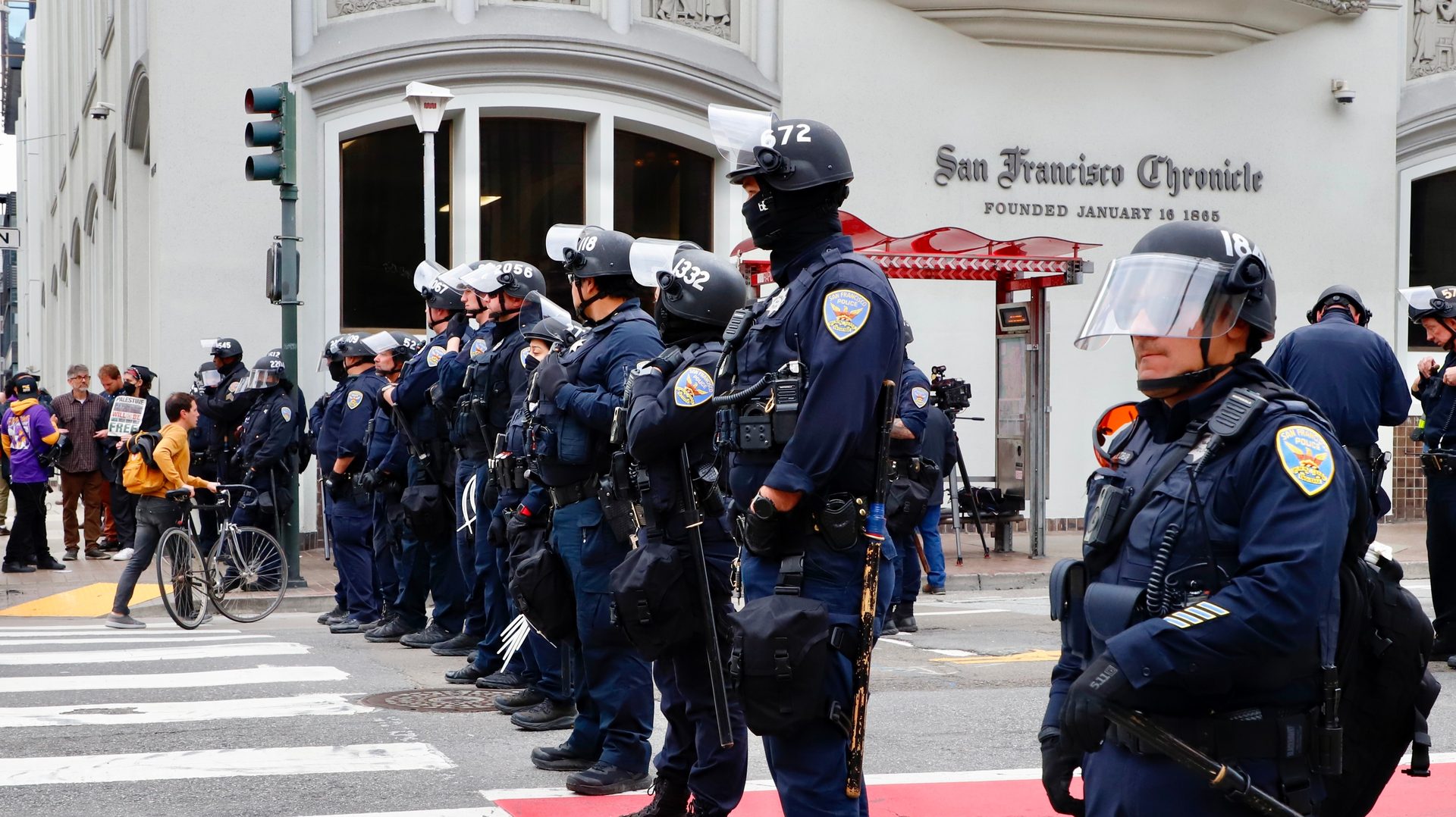
“No to APEC” protesters gather at 88 Fifth Street in San Francisco on Nov. 15, 2023. (Eve Lu/Peninsula Press)
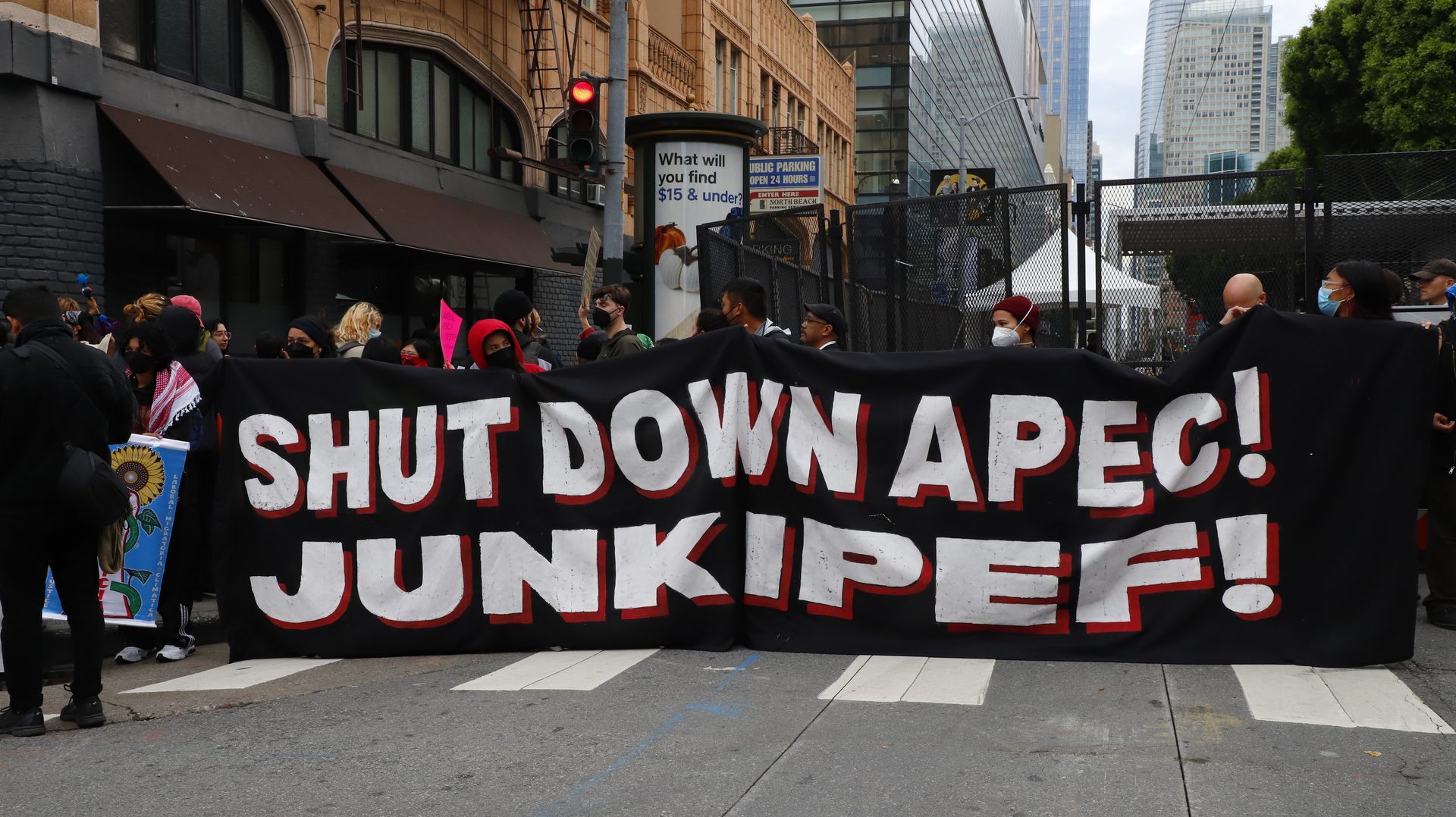
APEC STRUGGLES TO EARN FAVOR WITH S.F. ACTIVISTS
Donna Dennis, a member of the human rights group International Alliance of Women who was present at the demonstration on Nov. 15, said APEC wraps the idea of viewing women as an untapped source of labor to increase super profits for big tech companies into their so-called solution of empowering women in the economy.
“This is just a tea party for the richest 1% elite, and they come at this with the viewpoint of how to continue to extract more cheap labor and natural resources to increase their economic gains,” said Dennis, adding that APEC leaders only engage in conversation among themselves and has excluded any voices from the ground that deserve a seat at the table.
Win-Mon Kyi, a member of the Myanmar Student Union consisting of migrants and refugees after the 2021 Myanmar Coup, also spoke to the concerns about the arms sales between the Myanmar military and other countries that were present in APEC this year.
Kyi said that the coup had led to widespread civil disobedience movement across the country, with the people demanding a return to democracy.
“The dictatorship in Myanmar has economic power; it has police power; it has military power; it has weapons, and they use it to terrorize the people,” said Kyi. “But where do they get this money from? Where do they get this power from? It's not by themselves, right? They actually hold hands with the governments that are here today.”
Protest poster displayed at Lathrop Library, Stanford University on Nov. 16, 2023. (Eve Lu/Peninsula Press)
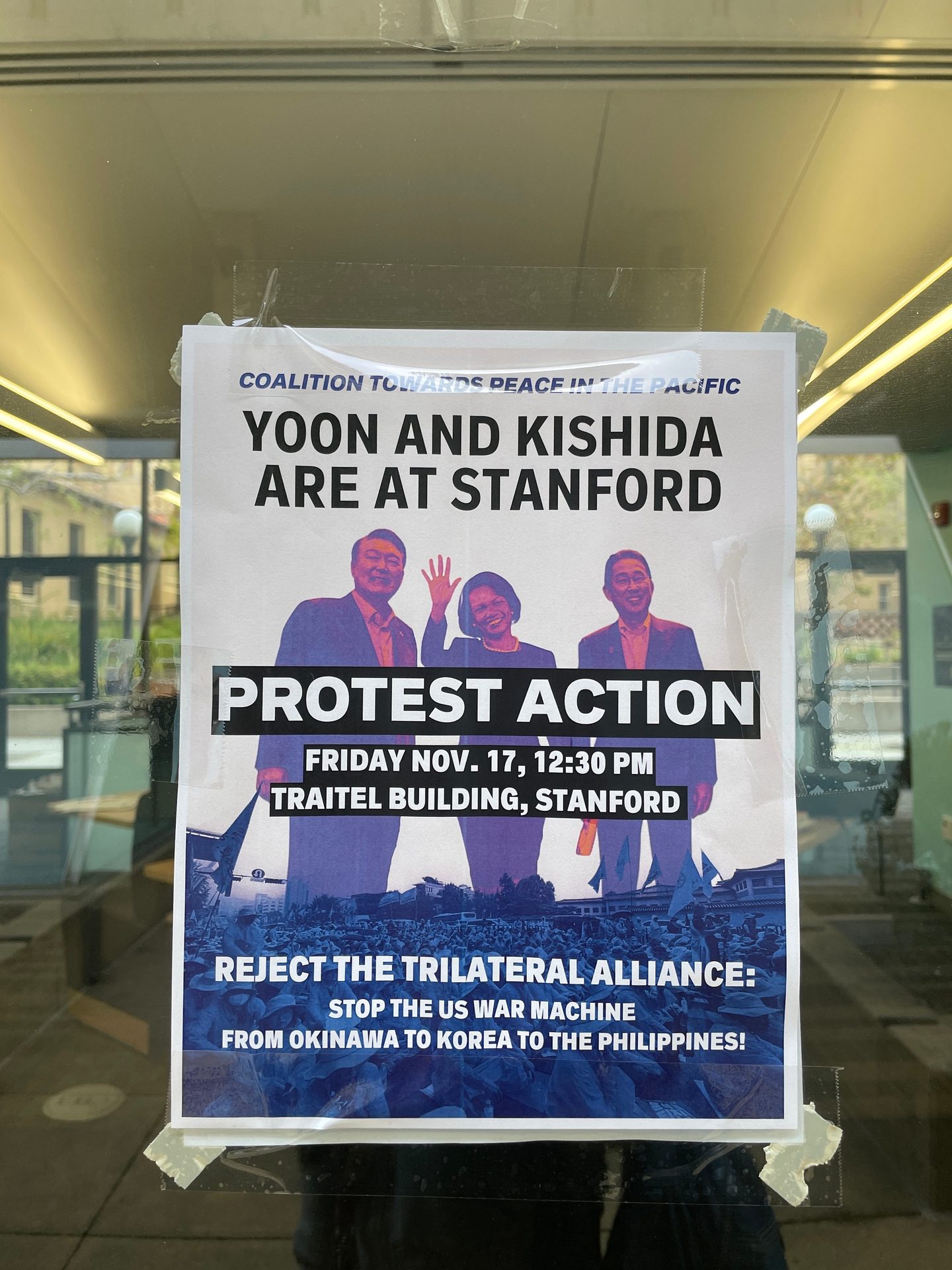
Holding up massive banners and waving various protest signs, the protestors chanted slogans, beat drums, and danced to demonstrate.
On Nov 17, outside the Hoover Institution, more than 50 “No to APEC” protesters packed near the building entrance. They took a stand against the leaders of South Korea and Japan, opposing U.S. involvement and its commitment toward trilateral military, economic and political collaboration.
Right at the center of the posters, there is a succinct headline “yelling” at people —— Reject the trilateral alliance: stop the US war machine from Okinawa to Korea to the Philippines!
Around the same time, Stanford's grounds were also adorned with some eye-catching protest posters featuring two prominent figures: South Korean President Yoon Suk Yeol and Japanese Prime Minister Kishida Fumio who were both invited to a special summit held at the Hoover Institution at Stanford University on Nov. 17, the final day of the APEC conference week.
Protestors Beat Drums
Protestor Danced
Protestors gathering at the Hoover Institution
A crowd of onlookers outside the Hoover Institution
Protestors Holding Signs
Sheen, a Stanford graduate student protestor of Korean descent who refused to share the last name, said APEC’s persistent promotion of neoliberal trade deals will have disastrous effects for on-the-ground workers, including austerity politics, pay cuts, labor repressions and a continuous outflow of wealth to figureheads from the core multinational corporations in the U.S. and Europe.
“Yoon, for example, is one of the most repressive labor presidents we have seen. He has caused multiple strikes by workers. One worker even set himself on fire in protest of Yoon's labor policies,” said Sheen. In May 2023, a South Korean labor leader self-immolated in protest against Yoon’s attacks on the 160,000-strong Korean Construction Workers Union and its rival union, when he declared some activities as "construction thuggery" and attempted to eliminate them.
Lee was shot by the Philippine military in 2019 for his efforts to defend indigenous Philippine lands from environmental and governmental degradation. He survived but has been permanently paralyzed from the chest down since then.
As a Chinese American, Lee first joined the League of Pilipino Students in 2003 when he transferred to San Francisco University because he wanted to see if he could use their methodology to organize the Chinese community. Later, Lee started volunteering for the Chinese Progressive Association (CPA) where he learned about the struggles of immigrant Chinese workers who fought for back wages after their jobs were offshored.
“It was during these years that I learned how interconnected our struggles are, and I became an internationalist and an anti-imperialist,” Lee said during the speech.
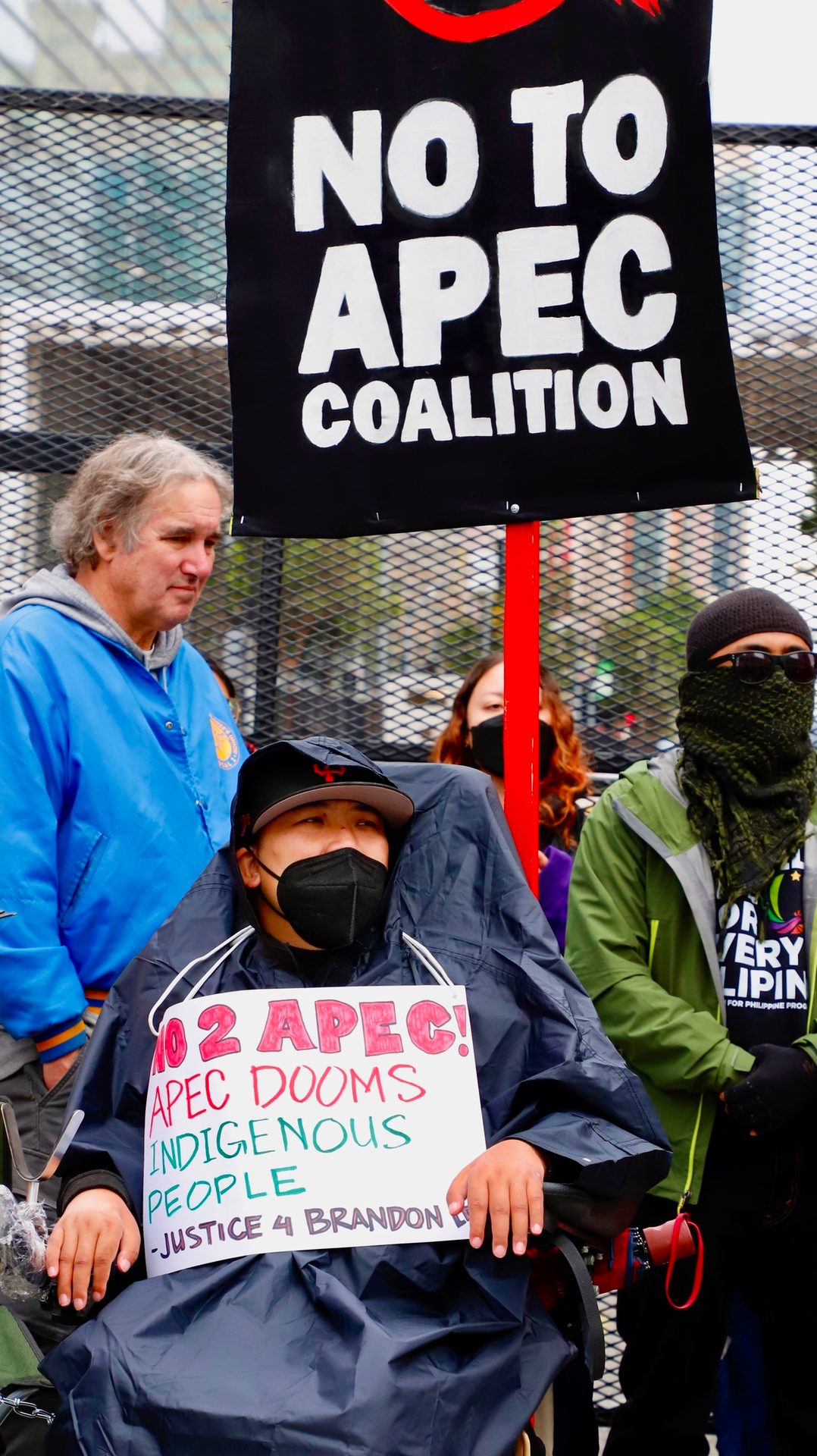
Brandon Lee, a San Francisco native and human rights activist who has been consistently advocating for Philippine liberation for nearly two decades, also actively took part in this year's “NO to APEC Coalition” protests.
As the keynote speaker for the kick-off protest of several actions against APEC, on Nov. 11, Lee gave a speech at San Francisco University, telling the participants why he said no to APEC.
THE RESISTANCE VOICE: BRANDON LEE, LEADERSHIP IN “NO TO APEC
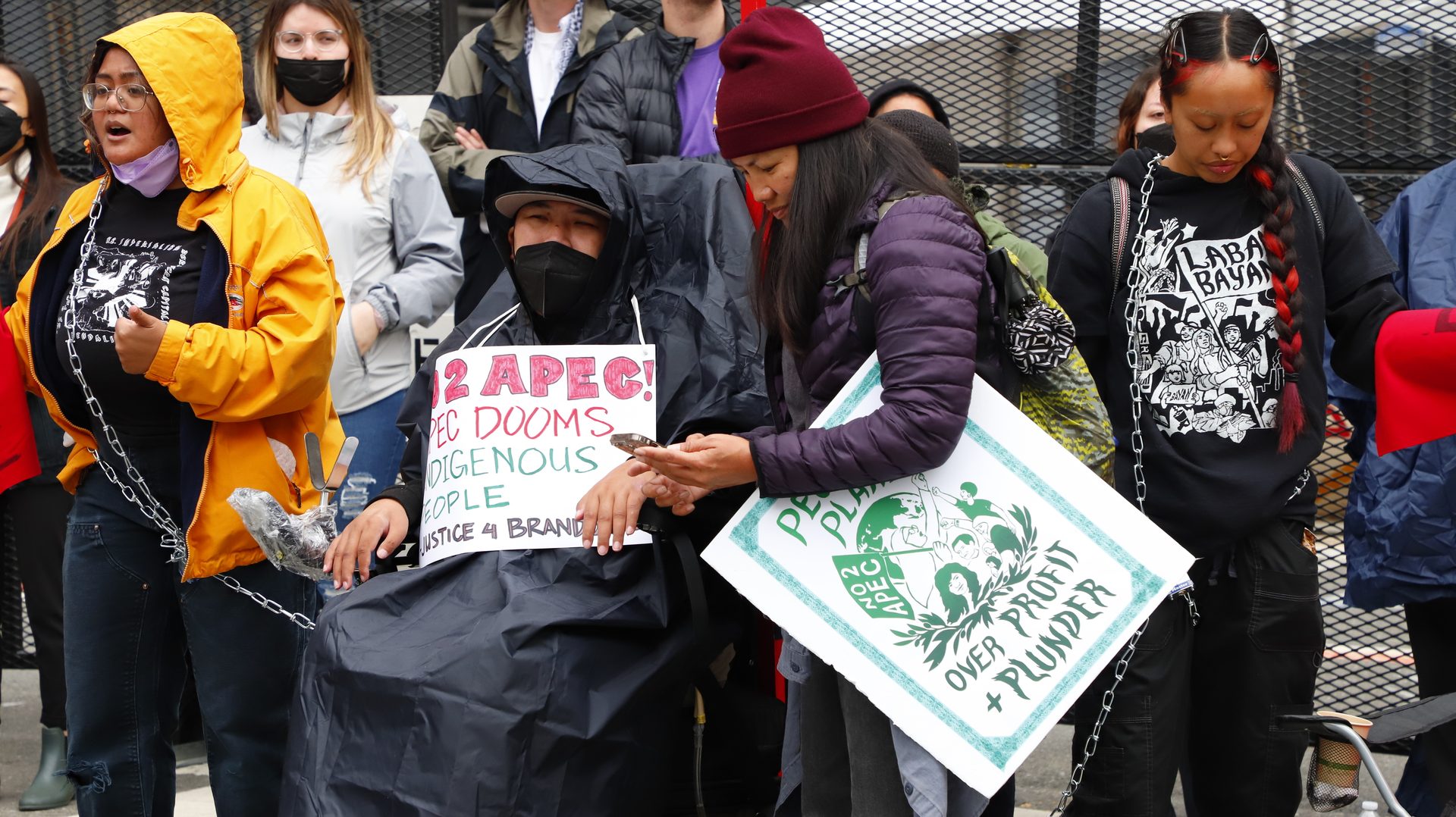
In 2007, Lee went on a life-changing trip to the Philippines where he integrated with many local peasants and workers as well as many indigenous people, listening to their voices as they fought against wages that were less than minimal.
Motivated to stand in solidarity against neoliberalism on the frontlines, three years later, Lee decided to move to the Cordillera region of the Philippines.
“There, I learned about APEC and how APEC really impacted the indigenous people because of the Mining Act of 1995,” said Lee, explaining that the Mining Act, one of the outcomes of APEC economic policies, liberalized the mining industry, allowing foreign mining companies to reap 100% of the profits from the plundering of Indigenous people’s lands.
Lee said the Mining Act destroyed the local environment and exacerbated the climate crisis as the government was removing the forest, polluting the Earth, and displacing the indigenous people.
As more people stood in solidarity for indigenous communities, the Philippines military started hunting down those “jarring voices.” Lee said the Philippine state only cares about the corporations that they have a deal with instead of the indigenous people who live there.
“They militarized those communities. They bombed them. They strafed them with artillery fire,” said Lee, adding that during his time in the Philippines, many individual activists like him were all labeled as terrorists. “They threatened, harassed, and [the individual activists were] placed under surveillance, like what happened to me,” said Lee.
Lee stayed in the Philippines for nine years until August 6th, 2019, when he was shot four times by the Philippine forces. No investigation was undertaken, even after he was airlifted back to San Francisco.
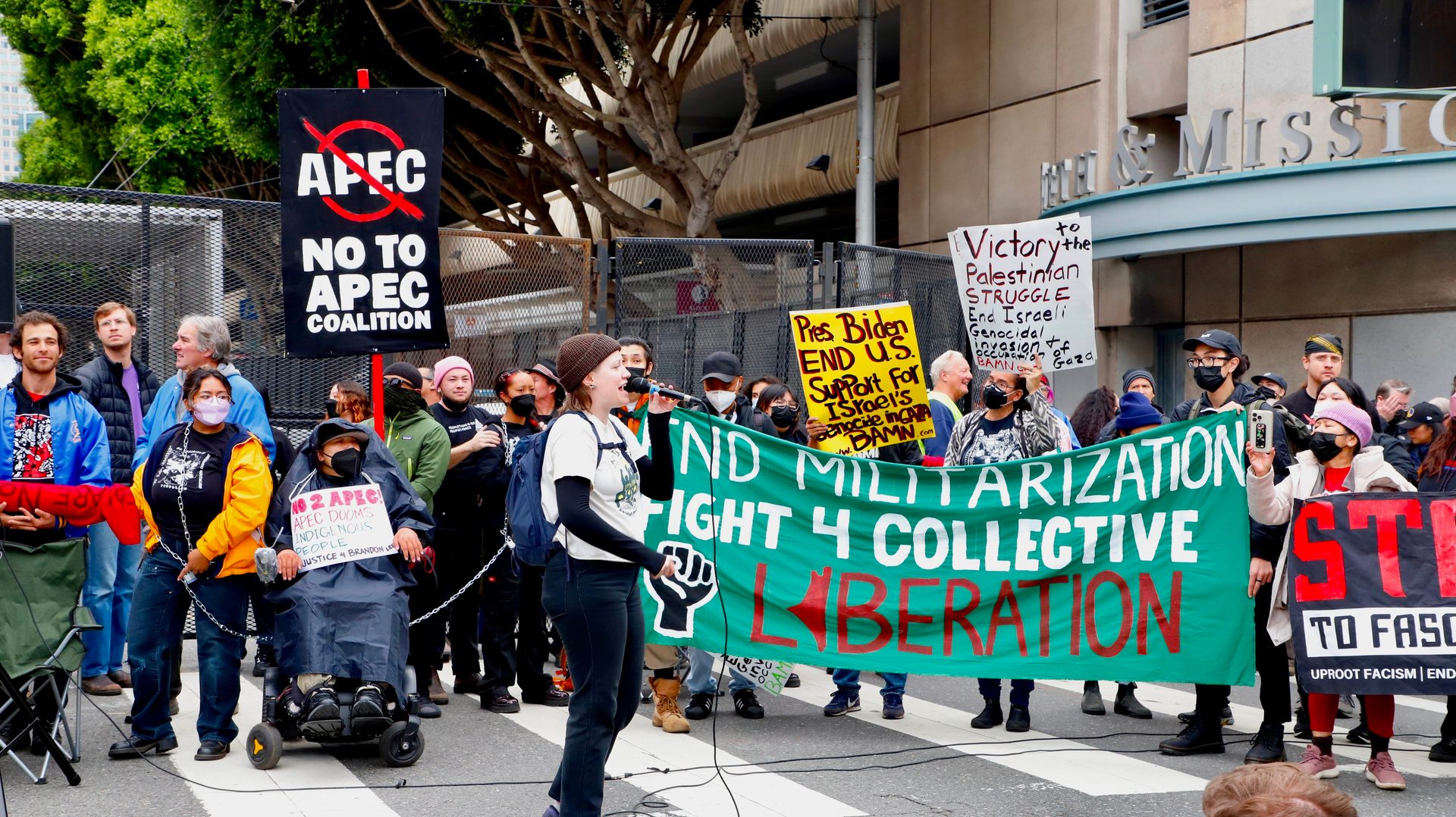
Now, four years have passed. Yet, Lee is still active in the frontline protests, even in his wheelchair.
“We are there to show our attitude and we are protesting many things,” said Lee.
For Lee, he thinks it is crucial to form a coalition, learn what is happening, and join the solidarity with people’s struggles worldwide — whether it is in Palestine, Myanmar, the Philippines, Brazil, or wherever there is a movement against women, labor, war, or imperialism.
“Those are things we should join hands with,” said Lee.
Brandon Lee, a San Francisco native and human rights activist, shows up at the demonstration against the APEC summit in downtown San Francisco on Nov. 15, 2023. (Eve Lu/Peninsula Press)
Brandon Lee presents at the demonstration against the APEC summit in downtown San Francisco on Nov. 15, 2023. (Eve Lu/Peninsula Press)
Brandon Lee, along with other "No to APEC" protesters, participates in the downtown San Francisco demonstration against the APEC summit on Nov. 15, 2023. (Eve Lu/Peninsula Press)